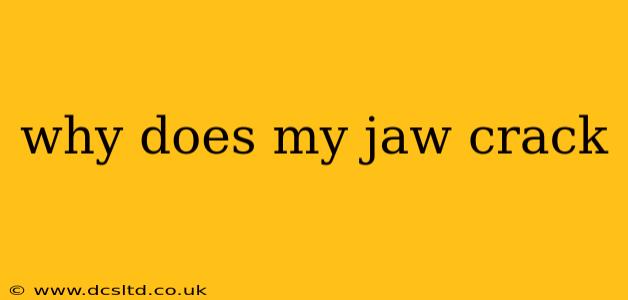Experiencing a cracking sound in your jaw can be unsettling, but it's a relatively common occurrence. Often, it's harmless, but understanding the potential causes is crucial. This cracking, popping, or clicking sound usually originates from the temporomandibular joint (TMJ), the complex hinge connecting your jawbone to your skull. This article explores the various reasons why your jaw might crack and what you can do about it.
What Causes a Cracking Jaw?
The most frequent cause of a cracking jaw is a problem with the temporomandibular joint (TMJ). This joint is incredibly intricate, responsible for a wide range of movements, from chewing and talking to yawning and smiling. Several factors can disrupt its smooth functioning:
-
Ligament Laxity: The ligaments supporting the TMJ can become loose or stretched. This laxity allows for more movement than usual, resulting in the audible cracking sound as the joint surfaces shift against each other. This is often associated with hypermobility, a condition where joints have an unusually wide range of motion.
-
Articular Disc Displacement: The articular disc is a small cartilage pad situated between the bones of the TMJ. If this disc slips out of its normal position, it can create clicking, popping, or grating sounds as the jaw moves. This displacement can be anterior (forward), posterior (backward), or medial/lateral (sideways).
-
Degeneration of Articular Cartilage: Over time, the articular cartilage can wear down due to age, injury, or repetitive stress. This wear and tear can lead to rough surfaces within the joint, resulting in clicking or grinding sounds. Osteoarthritis, a type of degenerative joint disease, is a potential contributor.
-
Inflammation: Inflammation of the TMJ, often caused by conditions like arthritis (rheumatoid or osteoarthritis), can cause stiffness, pain, and clicking or popping sounds.
-
Muscle Spasm: Tight or spasming muscles surrounding the TMJ can restrict joint movement and produce clicking or popping sensations. This is frequently associated with stress, bruxism (teeth grinding), or clenching.
Is a Cracking Jaw Always a Cause for Concern?
While a cracking jaw is often benign, it's essential to pay attention to accompanying symptoms. If the cracking is accompanied by:
-
Severe pain: Persistent, intense jaw pain indicates a more significant problem requiring medical attention.
-
Limited jaw movement: Difficulty opening or closing your mouth fully can signify a serious issue.
-
Locking: If your jaw gets stuck open or closed, it's a medical emergency.
-
Swelling: Swelling around the jaw may point to an infection or inflammation.
-
Headaches: Frequent headaches may be related to TMJ problems.
-
Earaches: TMJ disorders can sometimes cause ear pain.
If you experience any of these symptoms in addition to a cracking jaw, it’s crucial to consult a doctor or dentist immediately.
How Can I Treat a Cracking Jaw?
Treatment for a cracking jaw depends on the underlying cause and severity of symptoms. Many cases resolve with conservative management:
-
Over-the-counter pain relievers: Ibuprofen or naproxen can help manage mild pain and inflammation.
-
Heat or ice packs: Applying heat or ice packs to the jaw can relieve pain and stiffness.
-
Soft foods: Eating soft foods reduces stress on the TMJ.
-
Stress management techniques: Reducing stress through relaxation techniques can alleviate muscle tension.
-
Physical therapy: A physical therapist can teach exercises to strengthen and stretch the jaw muscles and improve joint mobility.
In more severe cases, a doctor or dentist may recommend:
-
Splints or mouthguards: These devices help to realign the jaw and protect the TMJ.
-
Medication: Muscle relaxants or other medications can be prescribed to address pain and inflammation.
-
Injections: Corticosteroid injections can help reduce inflammation in the TMJ.
-
Surgery: Surgery is rarely necessary but may be considered as a last resort for severe cases that haven't responded to other treatments.
What are the Long-Term Effects of a Cracking Jaw?
The long-term effects of a cracking jaw depend largely on the underlying cause and whether it's addressed. If left untreated, TMJ disorders can lead to chronic pain, limited jaw function, and even changes in the structure of the TMJ. Early diagnosis and appropriate management can often prevent these long-term complications.
When Should I See a Doctor?
It’s wise to consult a doctor or dentist if your jaw cracking is accompanied by pain, limited jaw movement, locking, swelling, or other concerning symptoms. Early intervention can often lead to a quicker and more effective resolution. A professional can accurately diagnose the cause of the cracking and recommend the best course of action.
Remember, this information is for general knowledge and shouldn't replace professional medical advice. Always consult a healthcare provider for diagnosis and treatment.
